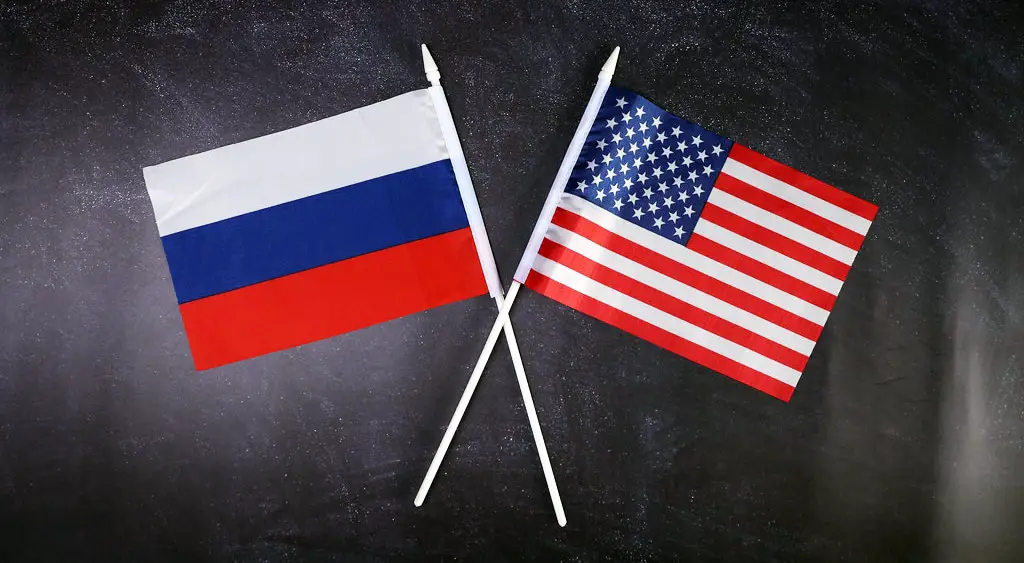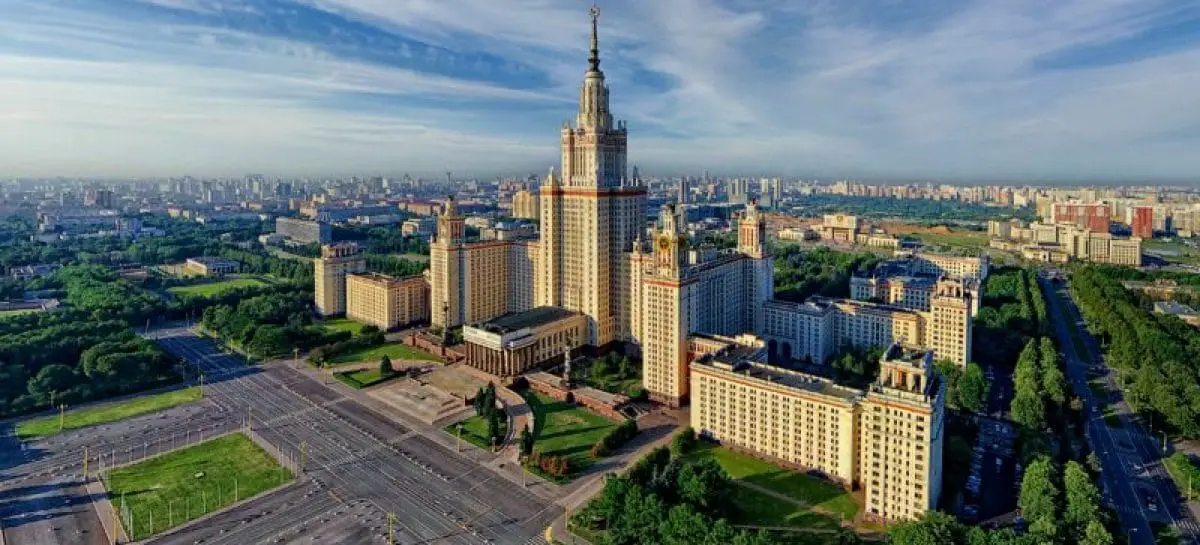As part of her major program in international relations at Moscow State University, Olga applied to study abroad in the United States in 2007. As was not uncommon for students applying for study abroad in either direction, Olga hit several bureaucratic snags. What is perhaps most remarkable about the below text, however, is the description of the program itself, which existed at a time when the US and Russia were still striving for better mutual relations. The American program afforded Moscow’s future diplomats an incredibly in-depth look at US public institutions and judicial processes.
This resource is part of a series of free Russian lessons sponsored by SRAS called Olga’s Blog. The blog documents – in simplified, modern Russian – Olga’s experience finishing high school, starting college, and living life in Moscow in 2006-2007. The text, links, and format of this resource were last updated in 2023.
Briefly on Study Abroad and International Relations
While bureaucratic snags in study abroad were always fairly common for both Russians and Americans seeking to study abroad in each other’s countries, most snags were nearly always surmountable. Olga’s, however, was not. She was simply not old enough to participate in the program and no exception could be made.
Ironically, this occurred in part because of Olga’s hard work and driven determination. Because Olga had participated in eksternat, an optional accelerated homeschooling program, she graduated a year early. Because Russia’s public education system supports eleven grades, most Russians graduate at 17. So, Olga graduated at 16, and, at the end of her first year of university, when her classmates were to head abroad on their program, she was only 17. Most American programs will assume that college students will be 18 or older – and this is the minimum age set by the San Diego State University, which was to host the students.
Olga’s disappointment is palpable. The program she would have participated in would have included first had experience observing America’s courts, prisons, and police patrols in addition to meeting her American peers and, of course, seeing what life on the ground is really like for the citizens of San Diego.
This experience, she feels, would widen her worldview and make her more competitive in applying for jobs to use her degree. This type of first hand cultural experience is essential for building empathy for a country that we might only hear about in narratives.
As of 2023, of course, relations have reached such lows that even educational, cultural, and space cooperation between the US and Russia have been cut to levels not seen even at the height of the Cold War. The day when we might again see ambitious future diplomats, eager to bring their countries closer together, preparing to embark on immersive study abroad experience in each other’s countries, appears to be far in the future.
Study Abroad for Russians: Simplified Russian Text from Olga’s Blog
This is Lesson 12 of Olga’s Blog, a series of intermediate Russian lessons.
Note that:
- All of the bold words and phrases have annotation below.
- Red words and phrases indicate the subject of this blog entry’s grammar lesson.
- *Asterisks indicate slang.
Дорогие друзья!
Учеба в МГУ включает не только стандартный курс обучения, но и производственную практику в среде носителей изучаемого языка. Для студентов нашего курса, изучающих английский язык, определили летнюю практику в США, в Государственном университете Сан-Диего. Почти вся наша группа записалась в эту поездку, но для того, чтобы поехать, нужно было пройти своеобразный конкурс – а именно, собеседование с американским профессором из университета Сан-Диего. Поначалу мне везло. Я успешно прошла собеседование и была включена в группу. Мои друзья и я живо обсуждали предстоящую поездку, которая предусматривала:
- общение с американскими студентами,
- участие в судебных процессах,
- посещение тюрем,
- патрулирование улиц с американскими полицейскими
- и др.

Все это было для нас ново и интересно. Мы разглядывали карту Калифорнии, тыкали в нее пальцами и предвкушали будущее удовольствие. Это должна была быть моя первая поездка в Америку. Но вдруг однажды вечером мне позвонил московский руководитель поездки и сообщил, что я не подхожу по возрасту. Оказывается, в Америке студенты могут участвовать в работе судов и посещать тюрьмы только с восемнадцати лет. А мне еще семнадцать. Так рухнула моя американская мечта. Я была сильно разочарована, ведь я мечтаю в будущем работать в одной из международных организаций. Для многих учеба за границей – это замечательная возможность узнать больше о других культурах, расширить свой кругозор, а также улучшить свое резюме. И, так как я хочу работать в международной организации, то я считаю, что мне нужно поучиться за границей. Иначе как я смогу конкурировать с другими желающими работать в таких организациях – с соискателями, у которых уже есть опыт сотрудничества с людьми и с учреждениями из других стран? Поэтому, когда мне исполнится восемнадцать, планирую вновь подать заявку и пройти практику в Америке.

И так, в этом году практику я проходила в Москве в туристической фирме «Клеопатра». Правда, несмотря на красивое название, работа была скучной – факсы, письма, телефонные звонки… Все было однообразно, и очень скоро все это мне стало неинтересно. Единственное, что доставляло мне удовольствие – это разговоры с потенциальными туристами. «Клеопатра» специализируется в основном на Египте. В эту страну ездят многие россияне, так как там очень тепло, есть прекрасные пляжи, и россияне могут ездить туда без визы. Я была в этой стране несколько раз, и с удовольствием рассказывала туристам о пирамидах, об Асуане, о Красном море, о монастыре Святой Екатерины, о разноцветных рыбках и кораллах и снова переживала свои египетские впечатления. Если в следующем году моя американская мечта исполнится, то я с не меньшим удовольствием буду рассказывать об Америке. Пока! Может быть скоро увидимся в Америке!
Vocabulary and Cultural Annotations
Производственная практика: Internship. Literally, the phrase translates to “practical training.”
В среде носителей изучаемого языка: Among native speakers of the studied languages. Here, it might be more natural in English to phrase this as “among native speakers of the languages we study/are studying.” Translators generally try to retain grammatical forms, but must constantly weigh the benefits of rephrasing with remaining true to the original text.
Поначалу мне везло: I was lucky at first.
Предусматривать/предусмотреть (что-л.): include/provide for. Can also be used in the meaning of to foresee/anticipate/envisage.
Участие в судебных процессах: Participation in legal proceedings. The program seeks to show future Russian diplomats all levels of how the American justice system works.
Посещение тюрем: Visiting prisons. Note that here “тюрем” is “тюрьма” in the genitive plural. The soft sign in “тюрем” changes to an “e” when the word is conjugated.
Патрулирование улиц с американскими полицейскими: Patrolling streets with American policemen. Again, note that “улиц” is “улица” in the genitive plural. Here, the last “а” is dropped, as required by the basic rule. No additional changes are needed.
Предвкушать/предвкусить (что-л.): To look forward to.
Подходить/подойти по возрасту: To become/be of age. As might be expected, considering that visits to prisons and patrolling streets with policemen are not actions that can be guaranteed safe, the university is reluctant to allow people to participate who are not legal adults.
Рухнуть (что-л.): to crash, collapse, fail. This verb has no imperfect form. Note that “рухнула мечта” is considered an slang version of the world. “Рухнуть” is most often used to refer to physical structures collapsing.
Учеба за границей: Study abroad.
Расширить свой кругозор: expand one’s horizons. “Кругозор” can be “outlook,” “range of interests,” and “world view” in Russian.
Проходить практику: To spend an internship. However, remember that “Пройти/проходить” can also be used in the context of “to study” and can be used in context of courses and lessons as well (i.e. Пройти/проходить уроки – to study lessons).
Коралл: coral.
Grammar Focus: Capitalization
The following are some of the main capitalization rules for the Russian language. This resource has been largely translated and adapted from one of the best Russian-language sites on the Russian language, russianlearn.com. SRAS has loosely grouped the rules into the various categories listed here. Note that this is not a complete list of rules, but it is extensive. Also – before you complain that there are too many rules here to learn, try looking up the rules for use of the English word “the” and remember that all students have the challenge of learning incredibly complex sets of rules for proper use of any language. Examples used from this month’s Olga’s Blog are in bold.
General
-
The first word of a text or new sentence is capitalized.
-
A word after a colon is capitalized if it begins direct speech or begins a quote.
-
Authors can chose to capitalize common nouns to show special respect, importance, or authority (e.g. Родина – the Motherland; Человек – Mankind).
People Related
-
First names, patronymics and last names are capitalized. Nicknames and pseudonyms should also be capitalized (e.g. Александр Сергеевич Пушкин – Alexandr Sergeevich Pushkin; Pичард Львиное Сердце – Richard the Lionheart; Владимир Красное Солнышко – Vladimir the Red Sun).
-
Particles in foreign names are not capitalized (e.g. Людвиг ван Бетховен – Ludwig van Beethoven; Леонардо да Винчи – Leonardo da Vinci).
-
Names related to religion and mythology, are capitalized (e.g. Христос – Christ; Будда – Buddha).
-
The names of ranks, titles and positions are never capitalized (e.g. министр – Minister, президент – President, генерал – General, папа – Pope).
-
Common nouns derived from the names of people are not capitalized (e.g. ловелас – Lovelace; донжуан – Don Juan; меценат – Maecenas).
-
The names of people used in disdainful meaning to describe a group or type of person, is not capitalized (e.g. азефы – traitors; Yevno Azef was a longtime head of the terrorist wing of the Socialist Revolutionary Party and an employee of the department of police. He is known as someone who betrayed both sides).
-
The names of items and phenomena derived from names are not capitalized (e.g. ом – ohm; ампер – ampere). Note that this rule is to be applied even to brand names that have been derived from a person’s name when referring to general product. However, when referring to a specific type or model of a product, the name and other words included in the proper name of the product will be capitalized. Any words used to identify what the product is are not capitalized (e.g. ездил на форд – but – ездил на Форд Фокус; пострелять из калашникова – but – пострелять из автомата Калашникова).
- Adjectives formed from people’s names are capitalized if they:
– have the meaning of possession (express possession by a person or a mythological creature) and have affix -ов (-ев) or -ин (without -ск-) (e.g. Лизина работа – Lisa’s work);
– denote names equal in meaning to “named after,” “in the memory of,” a certain person (e.g. Ломоносовские чтения – recitation in memory of Lomonosov). - Adjectives formed from people’s names are not capitalized if they:
– describe a method or style or an item or phenomenon AND do not indicate possession (e.g. пушкинский стиль – a style like Pushkin’s; суворовская тактика – the tactics like Suvorov’s; адамово яблоко – Adam’s apple; сизифов труд – labor of Sisyphus);
– denote possession but also include -овск- (-евск-) or -инск- (e.g. толстовская усадьба – Tolstoy’s country estate; тургеневские “Записки охотника” – Turgenev’s “Sketches from a Hunter’s Album). - Adverbs formed from people’s names are never capitalized (e.g. по-пушкински – in the way Pushkin did, по-суворовски – in the way Suvorov did).
Place and Direction Related
- The names of astronomical and geographical objects are usually capitalized. This includes the names of states, administrative regions, streets, and buildings. If these names have two or several words, all the words of the name are capitalized except for any word indicating what the object is. (e.g. созвездие Большого Пса – the constellation of Canis Major; Северный полюс – the North Pole; Балканский полуостров – the Balkan Peninsula; мыс Доброй Надежды – the Cape of Good Hope; Скалистые горы – the Rocky Mountains; Балтийское море – the Baltic Sea; Москва-река – the Moscow River; yлица Горького – Gorky Street; монастырь Святой Екатерины; Красная площадь – Red Square).
- An important exception to the above rule is that the words солнце (the Sun), луна (the Moon), and земля (the Earth) are capitalized when they are used as astronomical names, but not when they are used in compound nouns (e.g. вокруг Солнца обращаются планеты – planets go round the Sun; Земля со своим спутником Луной – the Earth with its satellite the Moon; but восход солнца – sunrise).
- The names of the cardinal points (север – North, юг – South, etc.) are not capitalized.
- The word кремль is capitalized when it is a proper name of a city area, but not when it is used as a common noun. (e.g. В центре Москвы находится Кремль – The Kremlin is located in the center of Moscow; but: В Пскове, как и в других старых русских городах, имеется кремль (In Pskov, as in other old Russian cities, there is a fortress).
History Related
- Names of historic events, epochs, phenomena, documents, and works of art will have the first word – and any proper names they include – capitalized if they are:
– names consisting of one noun (e.g. Ренессанс – Renaissance, Реформация – Reformation);
– combine an adjective formed from a proper name with a noun (e.g. Петровская реформа – Peter’s Reforms);
– begin with an adjective or a noun (e.g. Смутное время – the Time of Troubles; Третья республика – the Third Republic, Июльская монархия – the July Monarchy). - If the names of historic periods are used as common nouns they are not capitalized (e.g. cтиль ренессанс – Renaissance style)
- Some names of historic events, epochs, and phenomena are not considered proper nouns in Russian. These are not capitalized (e.g. феодализм – feudalism, средние века – the Middle Ages, вторая мировая война – World War II).
Time Related
-
The names of months and the days of the week are written with a small letter.
-
The names of religious holidays are not capitalized (e.g. рождество – Christmas; святки – yule-tide; масленица – Shrovetide).
Organization Related
- All the words, except prepositions, etc., within the names of most international organizations are capitalized (e.g. Opганизация Объединенных Наций – the United Nations Organization; Совет Безопасности – the Security Council; Общество Красного Креста – the Red Cross).
- In the official names of political parties in Russia, only the first word that is not “партия” is capitalized (e.g. Либерал-демократическая партия – Liberal Democratic Party; партия Земли и воли – Party of Land and Freedom).
- The names of foreign political parties are not capitalized (e.g. лейбористская партия – Labor Party).
- If abbreviated, all letters of the abbreviation are capitalized. (e.g. МГУ – MGU; ООН – UN).
- Names of universities, whether in Russia or outside, will have the first letter of the first word capitalized and any proper names within the name capitalized. (e.g. Государственный университет Сан-Диего – San Diego State University).
Publication and Award Related
-
In the names of books and articles, only the first word and proper names are capitalized. (e.g. Несбывшаяся американская мечта – This month’s Olga’s Blog)
-
Names of awards, literary works, newspapers, magazines, organizations will have the first word – and any proper names thy contain – capitalized. (e.g. “За отвагу” – For Courage (medal); “Ленинградская правда” –Leningradskaya Pravda (newspaper); “Новый мир” – Novy Mir (magazine); “Князь Игорь” (opera); “Серп и молот” (a factory – these are considered organizations in Russian).
-
If any of the above also carries a second name, the second name behaves as if it were an independent first name: (e.g. “Похождения Чичикова, или Мертвые души” – The Adventures of Chichikov or Dead Souls).
More Free Russian Lessons From Olga’s Blog
The Language and History of Caviar: Olga’s Blog
0 commentsOlga below describes the place of caviar in Russian food culture. In simplified Russian, she describes where the delicacy is harvested from, the major types of caviar, and how the types differ in cost and quality. We also provide an English primer below discussing more of the history of caviar, how it is eaten and […]
Mushrooms in Cultures and Cuisines: Olga’s Blog
0 commentsOlga below continues her discussion of the deeply held place that mushrooms have in Russian culture. In part one of this discussion, she focused on how and where and find the mushrooms. In part two, below, she discusses how the mushrooms are preserved, prepared, and consumed. A staple of the regional diet for centuries, mushrooms […]
Mushroom Season Has Begun! Olga’s Blog
0 commentsOlga below discusses the deeply held national tradition of mushroom gathering. An important part of Russian food tradition for many centuries, Russian children are taught in school from an early age to tell the difference between various types of native mushrooms. Many, like Olga, will go with relatives and friends to the woods to put […]
Study Abroad in America for Russians: Olga’s Blog
0 commentsAs part of her major program in international relations at Moscow State University, Olga applied to study abroad in the United States in 2007. As was not uncommon for students applying for study abroad in either direction, Olga hit several bureaucratic snags. What is perhaps most remarkable about the below text, however, is the description […]
What is the First Day of University Like in Russia? Olga’s Blog
0 commentsBelow, Olga discusses what a first year freshman experiences on day one of their college education. The day offers no classes. It is instead filled with speeches, handshakes, and status symbols. All of this is highly indicative of the role of formality and ceremony in Russian education and Russian society. This resource is part of […]












